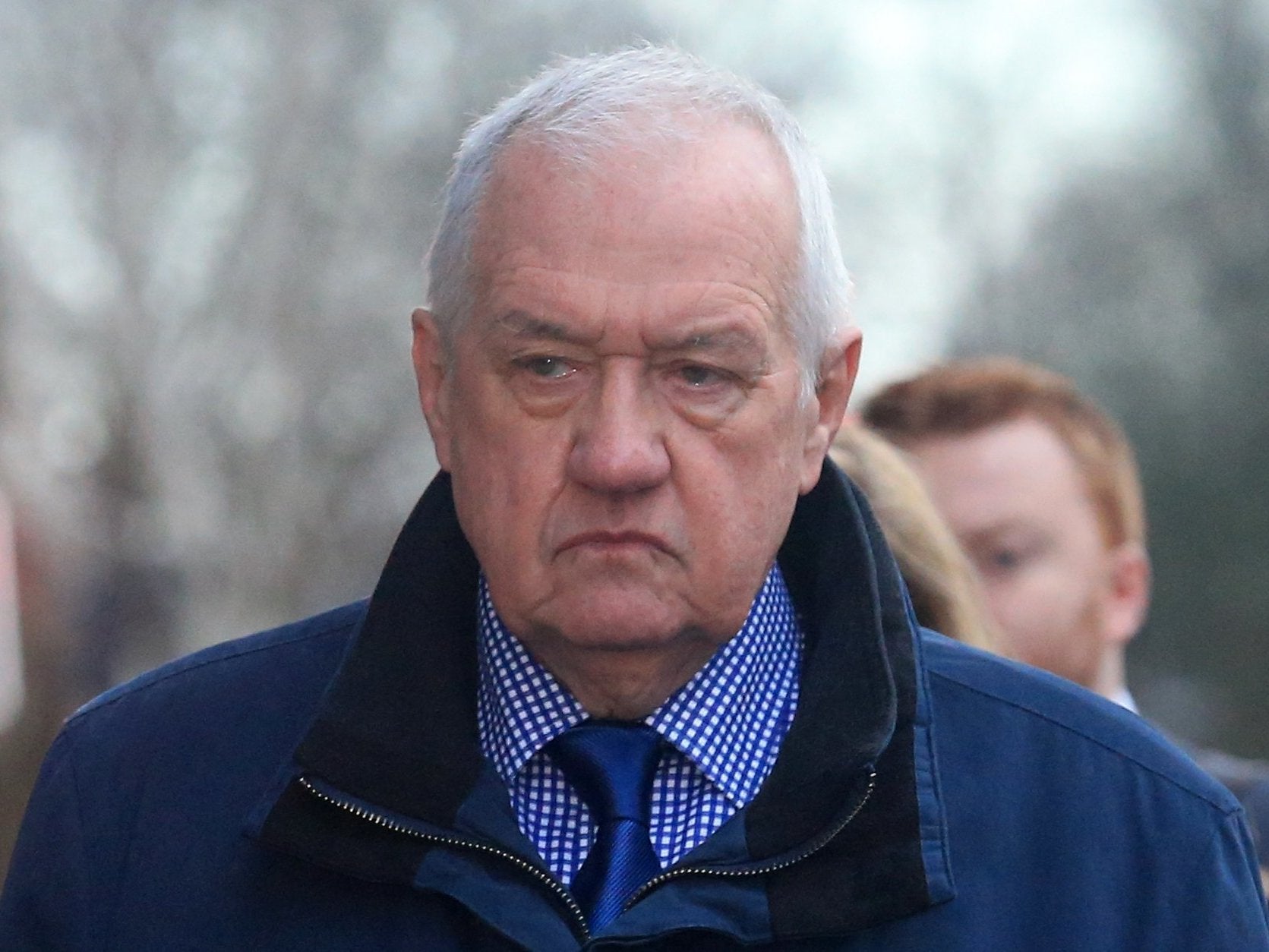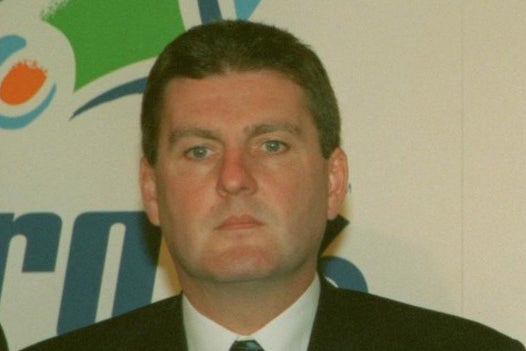Hillsborough trial: 'Extraordinarily bad failings' by match commander David Duckenfield caused fatal crush, court hears
David Duckenfield denies manslaughter of 95 victims
“Extraordinarily bad failings” by David Duckenfield led to the deaths of 95 Liverpool fans at Hillsborough stadium, a court has heard.
A prosecutor said the match commander, a former South Yorkshire Police chief superintendent, had “criminal responsibility” for the deaths of men, women and children who were crushed in the disaster.
Mr Duckenfield, now 74, sat metres away from victims’ relatives as all 95 names were read out at Preston Crown Court on Tuesday.
He denies manslaughter, while Sheffield Wednesday’s former safety officer Graham Mackrell pleads not guilty to two health and safety offences related to the stadium.
Richard Matthews QC, for the prosecution, told jurors that “many individual failures” played a part in the “appalling” events that unfolded on 15 April 1989.
“Undoubtedly, each of the deceased has been failed by many, in many ways and over a protracted period; before, during and even after this disaster,” he added.
“But is the prosecution’s case that Mr Duckenfield’s failures to discharge his personal responsibility were extraordinarily bad and contributed substantially to the deaths of each of those 96 people who so tragically and unnecessarily lost their lives.”
Ninety-four of the 96 victims died on the day of the disaster, while Lee Nicol passed away as a result of his injuries two days later.
There can be no prosecution over the death of the 96th victim, Tony Bland, as he died more than a year and a day after his injuries were caused.
Opening the prosecution’s case, Mr Matthews said that the match itself was not extraordinary, and mirrored the 1988 FA cup semi-final that was played between Liverpool and Nottingham Forest at Hillsborough.

He told the jury that in addition to failures in planning, organisation and management of the arrival, entry and accommodation of 50,000 football fans, there were also “many collective and individual failures to intervene effectively once the disaster unfolded”.
Mr Matthews said Mr Duckenfield did not declare the situation a “major incident” in good time, to put in place emergency measures to release those trapped and to provide adequate emergency medical attention and resuscitation.
“In the minutes before and after 3pm, 96 people received fatal injuries as a result of crushing in the central pens of the west terrace of the Leppings Lane end of the Hillsborough stadium,” he added, saying the youngest victim was just ten years old and many were teenagers.
“Each of those who died did so as a result of participation in the wholly innocent activity of attending a football match as a spectator, as a consequence of the obvious and serious risk to life posed by crushing from poor management of the expected capacity crowd … and as a result of the extraordinarily bad failures by David Duckenfield.”

The jury was shown images of the areas of Hillsborough stadium, which was the third-largest football ground in the UK at the time, where around 24,000 Liverpool fans attended the match.
Mr Matthews said that as thousands of spectators arrived, there were fears of injuries at turnstiles outside the stadium and a large exit gate known as Gate C was opened “following requests for Mr Duckenfield to do something to alleviate the crush”.
He told the jury that a large crowd was “naturally drawn” through a tunnel directly in front of the turnstiles, down a slope and into fenced pens where there were “no means to escape”.
Mr Duckenfield “gave no thought to the inevitable consequence of the flood of people through Gate C,” the prosecutor added. “He made no attempt to even monitor what was occurring, let alone take a step to avert the tragedy.”
Mr Mackrell, Sheffield Wednesday’s former safety officer, is accused of violating a government-issued safety guide and the terms of the stadium’s safety certificate regarding entry arrangements.
“It is the prosecution’s case that Mr Mackrell effectively shrugged off all responsibility for these important aspects of the role he had taken on as safety officer,” Mr Matthews added, detailing a lack of signage for alternative routes to standing terraces.
Mr Mackrell denies two health and safety offences.
Judge Openshaw said the Hillsborough disaster has received a “huge amount of publicity” for the past 30 years.
“What any of you have heard or read or seen in the past is entirely irrelevant to your task,” he told the jury.
“You decide what happened and whether these charges have been proved and you do so based on what you see and hear in the court, and nowhere else.”
The trial continues.
See our live coverage from the trial below
Please allow a moment for the live blog to load
Good morning and welcome to our live coverage of the Hillsborough trial. The jury has been sworn in and prosecutors are to open their case against match commander David Duckenfield and former Sheffield Wednesday club secretary Graham Mackrell.
The judge has warned the jury not to consider any past inquests or judicial proceedings over the disaster, or any evidence or views they hear outside the courtroom
Jury selection started yesterday with a pool of 100 potentials who were asked a series of questions about their ability to judge the case fairly
The judge, Sir Peter Openshaw, has warned jurors not to read anything on the internet or social media regarding the case.
Contempt of court restrictions are in place that apply to everyone for the duration of the trial
Judge Openshaw has acknowledged that the Hillsborough disaster has received a "huge amount of publicity" for many years.
"What any of you have heard or read or seen in the past is entirely irrelevant to your task," he tells the jury.
"What any other inquiry or court or inquest or jury or indeed anyone else has said or decided or failed to decide is entirely irrelevant to your decision. You decide what happened and whether these charges have been proved and you do so based on what you see and hear in the court, and nowhere else."
He cautions that jurors who conduct research out of court "might imperil the trial" and could lead to a prosecution.
The judge is laying out the format of the coming trial to the jury
Richard Matthews QC says:
"In the minutes before and after 3pm, 96 people received fatal injuries as a result of crushing in the central pens of the west terrace of the Leppings Lane end of the Hillsborough stadium."
He says the youngest victim was 10, while others were aged 14 and 15.
Another 27 of those killed were older teenagers, while 40 victims were aged in their 20s. The oldest person killed was 97.
94 of the 96 succumbed on 15 April 1989, Mr Matthews says. Another man died two days later, and one person - Tony Bland - suffered brain damage caused by oxygen deprivation in the coma and was in a vegetative state until he passed away in 1993.
His death happened too long after the disaster to be covered by the manslaughter charges.
Mr Matthews says each victim was a Liverpool fan who had travelled to Hillsborough stadium for the match, and that their attendance should have been "properly planned for and safely anticipated"
"There was nothing extraordinary about that FA cup semi-final match," he adds, pointing out that the same engagement between the same teams had happened the year before. "It may well be that there was an extraordinary series of collective and personal failures of those resonsible for planning and management [of the game]"
Mr Matthews says there were also failures to intervene as the disaster unfolded, or to declare it a major incident, to put in place emergency measures, release those trapped and get adequate medical assistance.
"On that day, David Duckenfield was the very senior police officer in charge of the match," he adds.
"WIth that role came not just ultimate responsibility for the police operation to ensure the safe arrical and acommodation of fans, but a personal responsiblity to take reasonable care for the arrangements put in place. A personal responsibility to take reasonable care in the command of those beneath him and in the orders he gave, and the decisions he took.
"It is the prosecution's case that David Duckenfield's failures to discharge this personal responsibility were extraordinarily bad and that they contributed substantially to the deaths of each of those 96 people, who so tragically and unnecessarily lost their lives".
Mr Matthews says the victims died as a consequences of the "obvious and serious risk to life posed by crushing caused by poor management" of the expected crowd size for hte match.
"Each died as a result of the extraordinarily bad failures by Mr Duckenfield in the care he took to discharge his personal responsiblity on that fateful day."


Bookmark popover
Removed from bookmarks